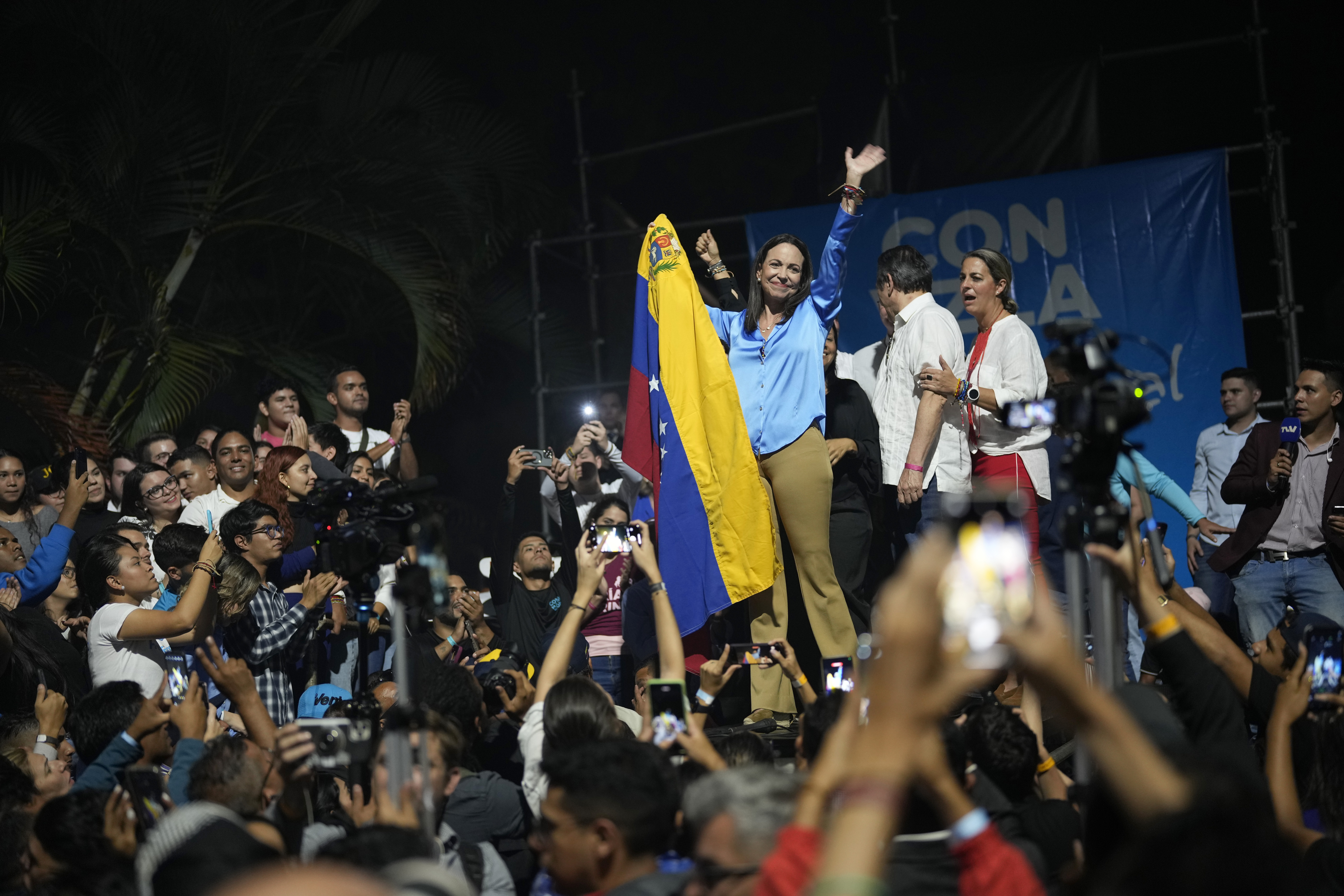Venezuela
Sought and found: Machado is the opposition's presidential candidate

Opposition presidential hopeful Maria Corina Machado celebrates with supporters after listening to the results naming her winner of the opposition primary election, at her campaign headquarters in Caracas, Venezuela.
© picture alliance / ASSOCIATED PRESS | Ariana CubillosVenezuela finds itself at a historic crossroads as it pursues to regain its democracy amid significant challenges. On October 22, the nation achieved a remarkable milestone in its tumultuous journey marked by political unrest, economic turmoil, and humanitarian crises. The opposition successfully conducted primary elections featuring ten candidates, rallying substantial popular support and underscoring their unwavering commitment to restoring democracy. Turnout exceeded expectations.
Conducting primary elections might seem standard in any democracy, but it signifies an extraordinary achievement in Venezuela. The obstacles faced in organising these primaries were enormous. The Maduro government abruptly altered the composition of the electoral tribunal (CNE) recently, securing a majority of pro-government judges, and offered belated and insufficient support for the primaries. The regime also prohibited the media from reporting on the elections, disqualified key opposition figures from holding public office, and imposed travel restrictions. These challenges are stark reminders of the arduous path that reformers in Venezuela must navigate to eventually rebuild its democracy. Despite this, the primary campaign saw a mass mobilisation of Venezuelans from all walks of life, indicating a clear and widespread demand for peaceful change.
Notably, the center-right candidate, María Corina Machado from the liberal party VENTE Venezuela, who had been banned from public office in June by a government-controlled entity, emerged as the clear winner with over 92% support (with almost two-thirds of the ballots counted). According to the electoral commission, about 2.3 million Venezuelans participated in the primaries, exceeding many expectations. Anyone who participated in the primary elections revealed themselves as a supporter of the opposition, risking potential reprisals from local government authorities. In her first remarks following the results, María Corina Machado emphasised the high level of participation from across the country and the significant role played by the Venezuelan diaspora, which voted in more than 80 cities across 31 countries.
Indeed, the role of Venezuela's diaspora was pivotal, demonstrating unwavering support for the democratic reform movement. The primary elections not only energised Venezuelans within the country but also garnered global solidarity for the cause. However, the international community's role extends beyond the participation of Venezuelans living abroad.
The Barbados Agreement
Organising the primaries was not the only significant development initiated by opposition forces. The Unitary Platform - composed of various opposition factions - and the Maduro regime recently resumed negotiations mediated by Norwegian authorities. On October 17, an agreement between both sides marked a turning point.
The Barbados agreement aimed to ensure fair presidential elections in 2024 by incorporating audits, updating the electoral registry, involving international election observer missions, and safeguarding the right of opposition candidates to participate. Following this agreement, the United States, though not a direct participant, showed support by easing some economic sanctions imposed on Venezuela's oil, gas, and gold sectors. However, this easing of sanctions comes with a warning: if Venezuela fails to meet its commitments outlined in the electoral roadmap, which includes not unlawfully excluding opposition candidates, these sanctions could be reinstated. The US Department of the Treasury emphasized its preparedness to amend or revoke these authorizations should Maduro's representatives fail to fulfil their commitments. This underscores the crucial role of the international community.
Looking Ahead
Addressing candidate disqualifications and ensuring opposition unity are of utmost importance for achieving a lasting solution and restoring democracy and stability in Venezuela. The Maduro regime has an opportunity to allow a peaceful transfer of power, which will be necessary to rebuild the shattered economy and enable the return of millions refugees. International attention, strong support for a democratic transition, and the commitment of all parties to fulfil their promises are indispensable.
However, uncertainties loom on the horizon. Currently, the ban on Machado's candidacy is in place, and the wording of the Barbados agreement is unclear regarding whether she will be able to participate in the presidential elections. If the Maduro regime insists on their exclusion, the opposition might be forced to boycott the elections. In the worst-case scenario, several opposition parties within the Unitary Platform could decide to participate in the presidential campaign despite Machado's permanent exclusion. Such disregard for the primary election results would deeply divide the opposition and, given the impressive mobilisation in favour of Machado, have unpredictable consequences. In such a scenario, a divided opposition would pave the way for Maduro's re-election.
Therefore, it is of paramount importance that the United States of America, the European Union, and Latin American governments continue to demand the lifting of candidate bans unequivocally, preferably through an independent review process. They should make it explicitly clear that severe sanctions will be reimposed immediately if the government fails to meet these conditions for a genuine democratic election.
The situation remains complex as Maduro's government still maintains control over the National Electoral Council, the judiciary, and the security systems, potentially hindering the implementation of the new agreement and the conduct of competitive elections.
After the disqualification of Maria Corina Machado in June, the European Parliament sent a clear message by criticising this repressive measure and calling for free and fair elections. Europe and the rest of the international community face the challenge of exerting pressure on Maduro in the coming months. It is crucial to make it unequivocally clear to him that the opportunity for a peaceful and democratic transition must not be squandered. This transition is of paramount importance for stabilising Venezuela and putting an end to the ongoing crisis. With 7 million refugees, it represents not only the largest displacement and migration movement in recent South American history but also globally, there are few regions where so many people have fled their homeland.
Niome Hüneke-Brown is project manager of the Andean Countries Project Office of the Friedrich Naumann Foundation for Freedom in Lima, Peru.
